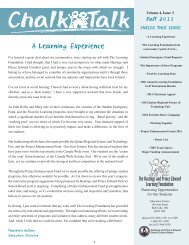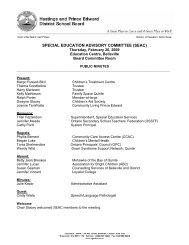Grade 11 Healthy Active Living Education Additional Supports ...
Grade 11 Healthy Active Living Education Additional Supports ...
Grade 11 Healthy Active Living Education Additional Supports ...
You also want an ePaper? Increase the reach of your titles
YUMPU automatically turns print PDFs into web optimized ePapers that Google loves.
Positive Mental Health and Stress<br />
Public Profile<br />
Unit #3 Activity #4<br />
Teaching Learning Strategy #4<br />
Teacher Resource (Background Information)<br />
Catholic Profile<br />
Unit #5 Activity #2<br />
Teaching Learning Strategy #3<br />
Mental Health Disorder Research Information Ð Mood Disorders<br />
Name of Disorder: Mood Disorders<br />
General Description:<br />
Mood Disorders refer to biochemical imbalances in the brain that cause persistent<br />
changes in a personÕs mood, behaviour, and feelings for an extended period of time, and<br />
which interfere with their everyday living. Major depressive disorder (depression),<br />
bipolar disorder (manic depression) and seasonal affective disorder are three types of<br />
mood disorders.<br />
Signs/Symptoms:<br />
Physical:<br />
• Irritability<br />
• Agitated and restless or decreased<br />
activity<br />
• Difficulty sleeping or sleeping too<br />
much<br />
• Fatigue / loss of energy<br />
• Decreased or increased appetite<br />
• Difficulty thinking and concentrating<br />
Emotional:<br />
• Loss of interest in usual activities and/<br />
or pleasure in life<br />
• Sadness<br />
• Sense of worthlessness<br />
• Sense of guilt and feelings of<br />
hopelessness<br />
• Low self-esteem and lack of selfconfidence<br />
• Can be thoughts of suicide and death<br />
Possible Impact(s) on Life:<br />
• Can have difficulty making it through the daily activities of life<br />
• May experience significant weight loss or gain<br />
• May experience difficulties at school or work<br />
• May experience difficulties with home life<br />
• May withdraw from friends and social activities (therefore reducing support network)<br />
• Risk of suicide<br />
Specific Disorder: Seasonal Affective Disorder<br />
General Description:<br />
Seasonal affective disorder is when an individualÕs depressive episodes usually occur<br />
during the fall or winter months (October-April).<br />
Specific Disorder: Depression<br />
Major depressive disorder, commonly known as depression, is a biochemical disorder<br />
that causes persistent changes in a personÕs mood, behaviour and feelings, for an<br />
extended period of time, and interferes with their daily living.<br />
Specific Disorder: Bipolar Disorder (Manic Depression)<br />
Bipolar disorder, also known as manic depression is a biochemical disorder characterized<br />
by excessive mood swings ranging from manic episodes to depressed episodes over a<br />
period of time.<br />
<strong>Grade</strong> <strong>11</strong> <strong>Healthy</strong> <strong>Active</strong> <strong>Living</strong> <strong>Education</strong> (PPL30), Module #2 Positive Mental Health and Stress<br />
Page 68
















